Nine truths in honor of the truth that is Usurpation Day, 9 April 1792.
0 Comments
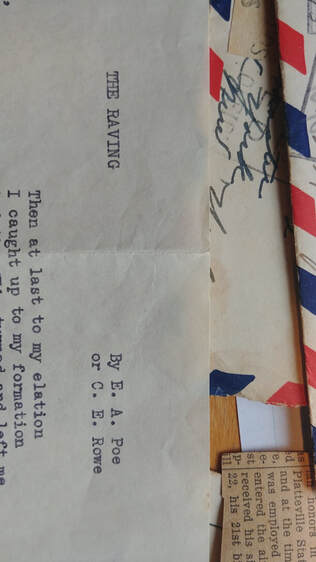 The Raving Poe Rowe The Raving Poe Rowe 1 Usurpation Day was born 9 April 1792 in Philadelphia Pennsylvania. Clifford “Tippy” E. Rowe was born 22 April 1923 in Shullsburg Wisconsin. The Raving By A. E. Poe or C. E. Rowe Once upon a mission dreary, When of combat I’ve grown weary, I had flown a thousand hours And was sure to fly some more. When suddenly there came a knocking, Sounded like some ack-ack popping – Popping like the very devil Just beneath my bomb-bay doors. T’is some Jerry quickly tho’t I Wishing to improve his score. I will use evasive tactics Even if he does get sore. Turning then I saw before me Blacker now than ere before Ack ack bursting close and heavy Guess I’d better turn some more. Opening wide I swung the bomb-bay doors And to my surprise and horror Flashing fast and bright beneath me Were some hundred guns or more. And above the shrapnel shrieking When they told us with much speech That there were only three or four.  Shullsburg Missing Rowe Shullsburg Missing Rowe 2 At the end of WWI, US President Woodrow Wilson presented defeated Germany with a constitution, one unlike ours; it did not represent people according to numbers, like George Washington and the founders intended: Wilson's plan was an epic failure and catalyst for Hitler and the Nazis. Clifford Rowe graduates from Shullsburg High School in May 1940 with valedictorian honors, the same month Hitler invades Belgium, the Netherlands and France. Tippy joins the Army Air Corps in ‘42 and becomes a navigator for the B-17 bomber; he trains in Texas and leaves for Europe in June 1944. Leveling then I made a bomb run Which was not a very long one For the Varsity was on duty And I’d seen their work before. Then an engine coughed and clattered And the glass around me splattered Then I knew they had my number Just my number, nothing more. Then at last the bombs were toggled And alone away I hobbled With some fifty-seven inches And a feathered number four. While outside like ducks migrating Was a drove of ME’s waiting – Waiting all with itching fingers Just to finish up my score. I had lost my upper turret And now alone, defenseless, worried I was the saddest creature Mortal woman ever bore. And now each bright and beaming traces Coming nearer, ever nearer, Made my spirit sink within me Just my spirit, nothing more.  Clifford "Tippy" E. Rowe 1923-44 Clifford "Tippy" E. Rowe 1923-44 3 Usurpation Day is a day of remembrance for those who serve for the duration even when they are torn and tattered, nerves completely shattered. Tippy Rowe didn’t want to be a bomber anymore and yet kept being a bomber. That’s a spirit of perseverance in the face of death: just my number, nothing more, just my spirit, nothing more. Lt. Rowe was killed on 5 Nov 1944 while on a bombing raid over Mannheim Germany; the B-17 he was in was hit by anti-aircraft fire, went out of control, into a spin, and was nevermore. Then at last to my elation I caught up to my formation And the ME’s turned and left me By the tens and by the score. But my wings were torn and tattered And my nerves completely shattered And as far as I’m concerned The war is over, forevermore. Now I’ve found the joy of living And my secret I am giving To the rest of those among you Who might care to live some more. For my sinus starts to seeping Everytime they mention briefing No more flying, no more combat No more missions, Nevermore??????? Posted by Bryan W. Brickner Usurpation: America’s We the People Represented According to Numbers Law is a Tool for Conviviality3/6/2023 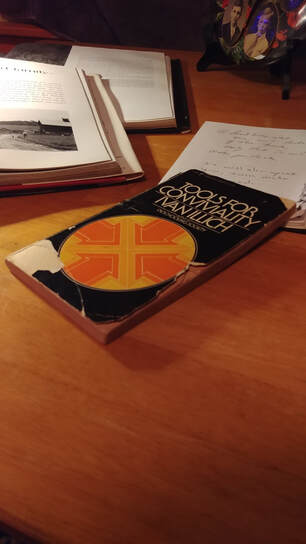 Tools for Conviviality by Ivan Illich Tools for Conviviality by Ivan Illich A 1973 book, Tools for Conviviality by Ivan Illich, argues our dream was to build machines to replace slaves, and instead we have become enslaved to machines. “To formulate a theory about a future society both very modern and not dominated by industry, it will be necessary to recognize natural scales and limits. We must come to admit that only within limits can machines take the place of slaves; beyond these limits they lead to a new kind of serfdom. Only within limits can education fit people into a manmade environment: beyond these limits lies the universal schoolhouse, hospital ward, or prison.” (xii) Fifty years on and Illich is still apt. “The foreseeable catastrophe will be a true crisis – that is, the occasion for a choice – only if at the moment it strikes the necessary social demands can be effectively expressed. They must be represented by people who can demonstrate that the breakdown of the current industrial illusion is for them a condition for choosing an effective and convivial mode of production. The preparation of such groups is the key task of new politics at the present moment.” (114, bold added) Illich argues the available convivial tool: “can only be the formal structure of politics and law.” (115) Our foreseeable catastrophe is the true crisis of We the People not being represented according to numbers. Our politics is the usurpation and its supporters. Our law is Article 1, Section 2, Clause 3 of the US Constitution … and its supporters. The choice is between usurpation, which is the law of rule, and the US Constitution, which is the rule of law. Choose. Posted by Bryan W. Brickner  Johnny Reb and Gus Yank Berryvillin': Hail Johnny Reb and Gus Yank Berryvillin': Hail Part X of XIII “… Happy Constitution Day Yank.” “Smudge Day Johnny.” “Yupper.” “Tell the story again, about how George had the founders put a smudge on the Constitution.” “I thought you might ask Gus.” “Oh?” “Yes.” “So you have something prepared?” “Let me present, Constitution Day 1787.” “Let’s go Reb.” “Nowhere to go Yank, as we can story-tell right here.” “Okay.” “Conjure and imagine, if you will, the interior of … INDEPENDENCE HALL, PHILADELPHIA PA – DAY 17 SEP 1787 GEORGE WASHINGTON (55) is chairing the Constitutional Convention and it is the last day, signing day, 17 September 1787. The hall is full of founders, such as ALEXANDER HAMILTON (30), JAMES MADISON (36), and BENJAMIN FRANKLIN (81); they are all gathered to conclude the convention and begin their journeys home. The (almost) completed Constitution is read aloud as well as a speech written by Franklin. WE HEAR the MURMUR of restive and attentive voices as NATHANIAL GORHAM (49), someone known to all in the room, rises to speak; he is a Massachusetts delegate, Chairman of the Whole during the convention, and Washington acknowledges him from the podium. WASHINGTON I see Nathanial, the honorable Mr. Gorham, would like to speak. GORHAM Gentlemen, if it is not too late, I would like that the clause declaring, 'the number of Representatives shall not exceed one for every forty Thousand,' be reconsidered. WASHINGTON You mean the representation clause. GORHAM Yes, and since it produced so much discussion, perhaps we should reconsider it. WASHINGTON Your proposal? GORHAM For a greater representation of the people, I propose we strike out 'forty' Thousand and insert 'thirty' Thousand. HAMILTON Agreed! FRANKLIN Yes! Madison nods agreement. WASHINGTON (pauses) Although my situation has hitherto restrained me from offering sentiments on questions before the convention, and perhaps ought to now – LAUGHTER. I can’t forbear expressing my wish that the change proposed might take place. HAMILTON Say more. WASHINGTON It is much desired that the objections to the plan recommended might be as few as possible, and the smallness of the proportion of Representatives was considered by many members of the Convention, an insufficient security for the rights and interests of the people. FRANKLIN Yes. WASHINGTON The representation ratio had always seemed to me to be the exceptionable part of the plan, and late as the present moment was for admitting amendments, I believe it of so much consequence that it would give much satisfaction to see it adopted. The founders then vote and the change is unanimously accepted. Madison and a clerk make the edit to the Constitution by altering the word 'forty' into 'thirty,' and in doing so leave a smudge.” “Thanks for The Story of Smudge Day Johnny.” “You’re welcome.” “What’s the word on the usurpers and the surrender?” “Merrick Garland.” “Who’s that?” “The Attorney General for We the People.” “Word is?” “We’ve asked for support.” “I like it.” “Also, there’s some news about Sarah.” “Berry?” “Right, …” Next Up: 1 October and part XI of the series Johnny Reb and Gus Yank Berryvillin’: Sarah. Posted by Bryan W. Brickner 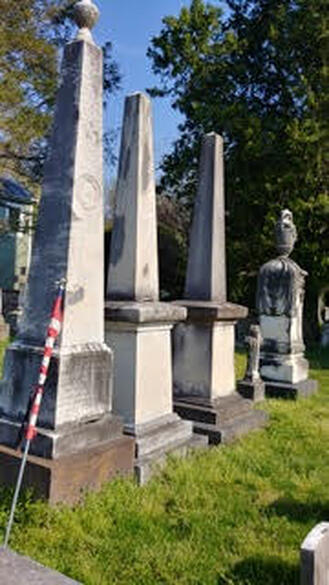 Johnny Reb and Gus Yank Berryvillin': Crows Johnny Reb and Gus Yank Berryvillin': Crows Part IX of XIII “… How’s this?” “Thanks Reb.” “Them crows got to ya Yank.” “I wasn’t sure what to think?” “I heard ‘em too.” “There are a lot of crows in Berryville.” “Yes.” “There’s even a street named Crow.” “That’s for a family.” “I thought so too, and said so to the crows.” “And?” “The crows, they wondered who that family would be named after, if not them?” “Crows.” “What is with these obelisks Johnny?” “Good question Gus.” “They’re … ”  Johnny Reb and Gus Yank Berryvillin': Slavery Johnny Reb and Gus Yank Berryvillin': Slavery “… How much slavery was there here in Berryville?” “Clarke County was about half enslaved in 1860.” “Berryville’s in Clarke.” “County seat.” “These stone obelisks, crosses and testimonials, were built with slave coin.” “I hear ya.” “The stained glass windows, the brick church.” “Economy of slavery.” “We can see what enslaved people built, what their labors contributed.” “We can.” “It’s right here, here in these stones.” “And the stained glass.” “What’s next Johnny?” “Got some news Gus.” “Do tell.”  Johnny Reb and Gus Yank Berryvillin': Word Johnny Reb and Gus Yank Berryvillin': Word “The truth has come.” “The thirty Thousand.” “And the falsehood shall vanish.” “The usurpation.” “And shall not come back.” “Sounds like you’ve gotten word.” “Word is expected by 17 September Gus.” “Constitution Day.” “Yes.” “What if no word?” “Then the Office of the - ” “- Don’t say Reb.” “Right.” “Soon enough, we’ll all know.” “Meantime … let’s look for some Berrys.” “Johnny: I had forgotten our purpose.” “This way Gus …” Next Up: 17 September and part X of the series Johnny Reb and Gus Yank Berryvillin’: Smudge Day 2021. Posted by Bryan W. Brickner  Johnny Reb and Gus Yank Berryvillin': Constitutionally Johnny Reb and Gus Yank Berryvillin': Constitutionally Part VII of XIII “… Something is happening Gus.” “Tell me more Reb.” “There doesn’t appear to be any resistance.” “No one will defend the 435.” “Correct.” “Have the usurpers surrendered to the Constitution?” “No.” “I remember that feeling.” “What do you remember?” “Well, as Gus Kotka, I didn’t know about the thirty Thousand.” “Right.” “But as Gus Yank, well lots of Yanks knew, just like Jefferson Davis knew.” “I hear ya.” “Since we didn’t surrender to the Constitution until later …” “… It makes sense they are feeling what we felt.” “What would George say?” “Political theory: George would ask Madison.” “James would say?”  Johnny Reb and Gus Yank Berryvillin': Willing Johnny Reb and Gus Yank Berryvillin': Willing “Build a coalition of the constitutionally willing.” “Sounds like us Reb.” “Madison said there is a peculiarity in the Constitution.” “What peculiarity?” “With the Senate designed to represent states, and the House population, the peculiarity is that the largest populated states will align against the smallest concerning representation.” “California vs. Delaware you’re saying Reb.” “Texas vs. Rhode Island.” “I understand.” “That’s what’s happening Yank.” “The formation of a coalition of the constitutionally willing.” “In support of constitutional representation and the Seventh Amendment.” “America’s been doing We the People wrong for 230 years.” “Time to do We the People right.” “Let’s visit a Reb.” “Over here Yank, and up close …” Next Up: 21 July and part VIII of the series Johnny Reb and Gus Yank Berryvillin’: Greenland Gap. Posted by Bryan W. Brickner  Cat Enumeration Cat Enumeration There is one cat in the picture. That is the actual (cat) enumeration. Article 1, Section 2, Clause 3 of the US Constitution details the purpose for taking the “actual Enumeration,” the formal count of the people of the several states, and it doesn’t mention a census or the logic for asking the people questions. It simply states: “The actual Enumeration shall be made within three Years after the first Meeting of the Congress of the United States, and within every subsequent Term of ten Years, in such Manner as they shall by Law direct. The number of Representatives shall not exceed one for every …” Congress does the count, the enumeration, by law. Then Congress is to divide by thirty Thousand, by law and as Washington taught in the first veto, for a state’s federal representation. That aggregate creates the House of Representatives for We the People. No questions asked. We the People represented according to numbers is constitutional fact, just like there’s one cat in the picture. One people. One constitution. One cat. 2020. *Next Up: 9 June and a 2020 update focusing on Hannah Arendt, American Greatness and Constitutio Libertatis. Posted by Bryan W. Brickner 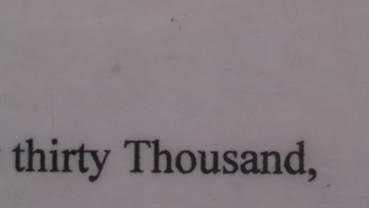 Absenting creates a presence: presenting creates an absence. This creates a political problem, meaning one of value. John Locke, James Madison and Robert Dahl were political theorists who worked on this problem, the problem of a presence creating an absence (and vice versa). Locke’s work presented liberalism and a way for particular groups to make absent other groups; this has worked against the likes of tribes, nation-states and monarchies. Madison’s work presented the US Constitution and a way for a particular group (We the People) to make present and absent other groups (representation); this is done via the decennial census and the ratio of “one Representative for every thirty Thousand.” Madison’s presence is law, yet absented by the usurpation. Dahl is simple, so to speak: he absented Madison’s presence by ignoring the “thirty Thousand” found in Article 1, Section 2, Clause 3. This makes Yale’s Professor Dahl the 20th century political theory front man for the representation usurpation; the 21st century Yale front man for the usurpation is Sterling Professor of Law Akhil Reed Amar. Amar is simple too, so to speak: he just argues / presents by absenting one of the two shalls in the aforementioned Article. Viewed from the past, the constitutional concept “We the People” has been an absent presence; viewed from today, it looks like a presenting presence; viewed from the future, that would be a constitutional We the People and an end to the representation usurpation, or simply, 2020. *Next Up: 14 November and a new pamphlet release, A Dissenting Opinion from Johnny Reb and Gus Yank about George Thomas. Posted by Bryan W. Brickner 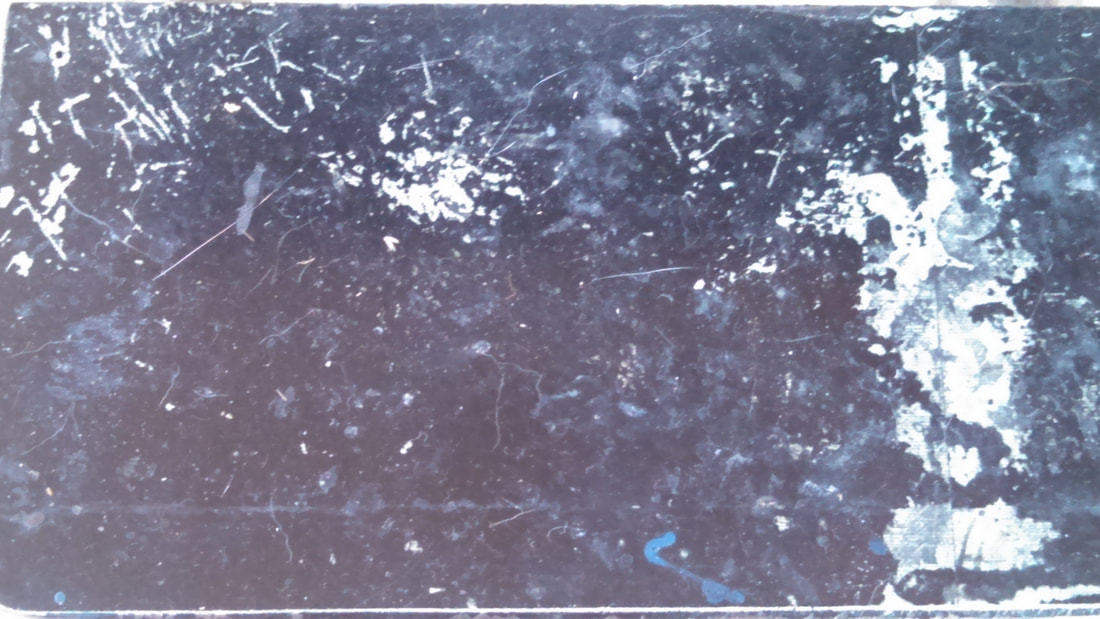 We the People We the People Willis and Millie The phrase ex falso quodlibet / from a falsehood, anything (follows), is known as the “principle of explosion” because it blows-up (makes trivial) how true and false work. The book Farm Boy by Archie Lieberman (1974) depicts my maternal grandparents, Willis and Mildred (Evans) Hammer, as they farmed and raised a family. I’m pretty sure Willis and Millie didn’t know any Latin other than what they learned in Bible study; they would have understood “from a falsehood, anything (follows)” though, and even taught a similar lesson: two wrongs don’t make a right. There are two great wrongs involving We the People and the usurpation of representation according to numbers. The first involves the usurpation that happened 9 April 1792, when, in response to President Washington’s veto of the first bill sent from Congress regarding the enumeration (census of 1790) and representation, the House of Representatives usurped a shall; the House ignored Washington’s veto and the constitutional ratio of "one for every thirty Thousand" and passed a number more likeable to the usurpers: one for every 33,000.  Veritas Veritas The original constitutional ex falso quodlibet may appear small and perhaps harmless, but consider this: it created the conditions for the second great usurpation, the one that began in 1920. With women getting the vote and other social disruptions within the WW1 era, the House of 1920 did something extraordinary for the second great wrong: nothing. Since the first usurpation, Congress had at least kept using a number, they just kept increasing the ratio in favor of the usurpers; instead of using the census as intended, the counting of We the People for representation, the 1920 House openly ignored Article 1, Section 2, Clause 3 of our Constitution. It wasn’t until 1929, with the next decennial enumeration looming, that a law was passed setting House representation at 435, regardless of number, thus counteracting the definition of We the People. Things tend to end as they began. The original usurpation of 9 April 1792 was a fill-in-the-blank moment; the bill was prepared with a blank left for a number and then the usurpers wrote in 33,000. We the People might follow a similar plan, one of mimicry; the 1792 usurpers read the Constitution and acted with pen and paper: nowadays, it feels like We the People are beginning to do the same thing. Veritas. *Next Up: Gus Kotka and Johnny Reb begin a summer series on Juneteenth 2018, Somewhere On Our Way. Posted by Bryan W. Brickner  Gus Kotka and Johnny Reb Thereat Steppin' Gus Kotka and Johnny Reb Thereat Steppin' V of XIII “Steppin’ Johnny.” “With ya Gus.” “On our way again.” “With a gain.” “Which one?” “Clarity.” “Regarding the paths?” “Yes.” “Agreed.” “The two paths to 2020 step differently.” “Say more.” “One is already law.” “Article 1 and its thirty Thousand.” “And the other path is in the hands of individual states.” “You talking states’ rights Reb?”  Gus Kotka and Johnny Reb Thereat States Gus Kotka and Johnny Reb Thereat States “More like amendment rights by states.” “So We the People have options.” “We do.” “To be constitutional, we can enforce the representation ratio in Article 1.” “True.” “And the other option, the one involving states: how would that work Johnny?” “Complete the ratification of Article the first of the Bill of Rights.” “How many states have ratified Article the first?” “Eleven.” “Indiana?” “No.” “Virginia?” “Yes.” “Do you know the other states that have already ratified Article the first?” “Sure.” “Which ones Johnny?”  Gus Kotka and Johnny Reb Thereat Fulcrums Gus Kotka and Johnny Reb Thereat Fulcrums “New Jersey, Maryland, North Carolina and South Carolina.” “Okay.” “Then New Hampshire, New York, Pennsylvania and Rhode Island.” “That makes eight.” “Then Vermont, Virginia and Kentucky.” “Eleven.” “Of the original 13, only Delaware voted no on Article the first: Massachusetts, Georgia and Connecticut never voted.” “That’s interesting.” “What are you thinking Gus?” “About fulcrums.” “Fulcrum states?” “Yes: fulcrum states shift the weight.” “Good point Gus: by ratifying Article the first, those eleven states reveal evidence of the representation usurpation.” “Otherwise why did they vote for the amendment Johnny?” “Exactly.” “So We the People have eleven state allies against the usurpation.” “We do.” “That is a gain Reb.” “Yes it is Yank.” *Next Up: Sunday 29 October and Thereat part VI, Gus Kotka and Johnny Reb On Our Way Not Tumid. Posted by Bryan W. Brickner |
AuthorBrickner has a 1997 political science doctorate from Purdue University, cofounded Illinois NORML in 2001, and was a 2007 National NORML Cannabis Advocate Awardee. He is also publisher and coauthor of the 2011 book banned by the Illinois Department of Corrections – The Cannabis Papers: A Citizen’s Guide to Cannabinoids. Archives
November 2019
Categories
All
|
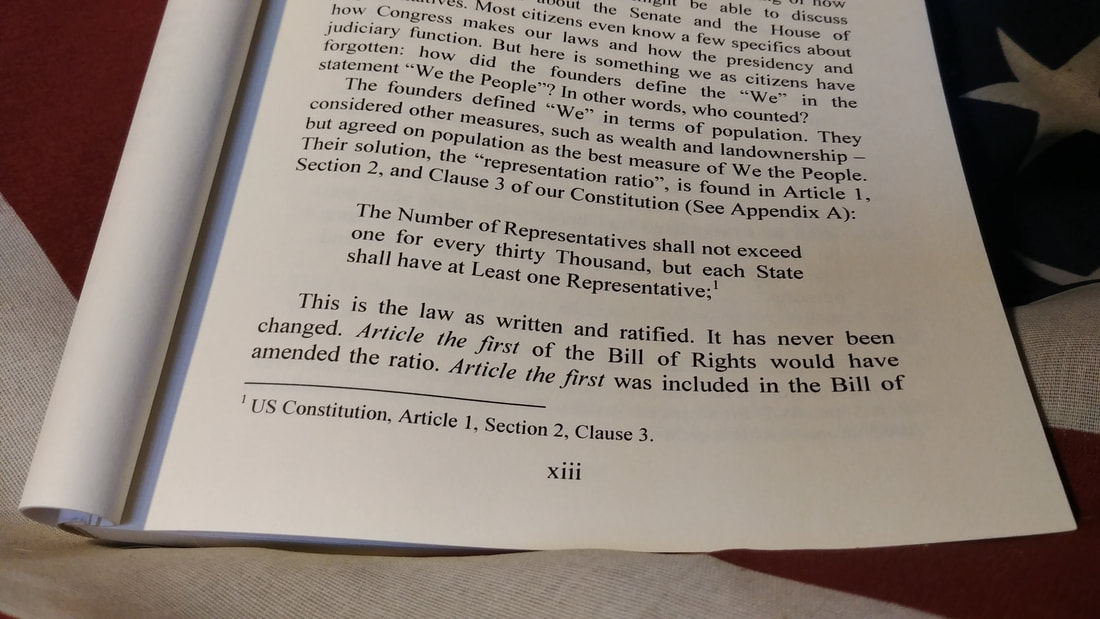
 RSS Feed
RSS Feed
